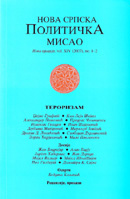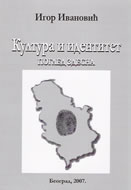| NSPM in English | |||
The end of multilateralism? |
 |
 |
 |
| utorak, 19. februar 2008. | |
|
For recognition of Kosovo's independence will contribute to the further erosion of two of the fundamental pillars of the international system - sovereign equality and the principle of the inviolability of borders. Proponents of independence have largely justified their stance by maintaining that Serbia has forfeited its sovereignty over Kosovo due to the human rights abuses committed against Kosovo Albanians and its subsequent loss of effective control over the province since 1999. Analysis of each, however, illustrates several key weaknesses that undermine the case supporting Kosovo's secession from Serbia. As the Badinter commission, established by the European community in 1991 to oversee the dissolution of the Former Yugoslavia, stated with respect to Bosnia and Herzegovina, "the right to self-determination must not involve changes to existing frontiers at the time of independence except where the States concerned agree otherwise". On this basis, Kosovo's previous declaration of independence in the early 1990s was only recognised by Albania. The current case for independence is instead based in part upon the human rights abuses committed by Serbia under Milosevic. In their 2006 London declaration, the six-nation contact group made it clear that, "ethnic cleansing and the events of 1999 ... must be fully taken into account in settling Kosovo's status". While not doubting the severity of these actions, there are two fundamental shortcomings to this argument as a basis for Kosovo's independence. First, it clearly ignores the plethora of human rights violations against Serbs and non-Albanians that have taken place since 1999, notably the March 2004 outbreaks of violence and the subsequent ending of Unmik's "standards before status" policy. There has been a systematic failure to ensure even minimum standards of protection for minority rights in Kosovo. According to Human Rights Watch, Serbs and other non-Albanian minorities have been subjected to "persistent intimidation and harassment". Since the arrival of Unmik in 1999, over 200,000 Serbs and other non-Albanians have left the province, with data from UNHCR showing that only 16,452 displaced persons have returned. In this context, recognising independence for Kosovo on the basis of human rights violations against Kosovo Albanians would concurrently justify a similar claim by Kosovo's minority communities. Second, there is little to suggest that the human rights violations used to justify Kosovo's independence would return if alternatives to independence, such as substantial autonomy, were proposed as solutions. The entire western Balkans region has made enormous strides in terms of democracy and human rights since the complicated disintegration of the Former Yugoslavia and its over-arching framework of protection and equality for its constituent peoples. Since the end of an armed uprising by ethnic Albanians in 2001, Serbia has established multi-ethnic local governments and joint Albanian-Serb police patrols in the Presevo Valley in the south of the country, described by the International Crisis Group as "one of the rare conflict resolution success stories in the former Yugoslavia"; whilst self-rule and minority rights are constitutionally guaranteed in Vojvodina, the country's second autonomous province. Serbia's transition to democracy since October 2000 provides further insurance against a return to the pre-1999 situation. A second main argument employed in support of independence contends that Serbia's loss of effective control over Kosovo, which has been under international administration since 1999, equates to a loss of sovereignty over the province. This argument, however, also contains a number of inherent flaws. First, UN security council resolution 1244 clearly states that the international administration must "promote the establishment, pending a final settlement, of substantial autonomy and self-government in Kosovo". Therefore, the very existence of an international administration cannot in itself be used to justify Kosovo's independence through Serbia's subsequent loss of effective control. Accepting this precedent would have damaging implications for similar peace-building efforts as countries become increasingly weary about authorising missions that would engender a loss of effective control over their own territory. Furthermore, as Unmik's presence derives from an illegal use of force by Nato, any change of borders justified by a resulting loss of effective control would constitute a changing of borders by military means - an act explicitly outlawed by the UN charter and one which the international community has consistently refused to validate throughout the postwar period. Setting aside the prime doctrines that have underpinned the international order since the second world war provides the most dangerous precedent of recognising Kosovo's independence. Undermining both sovereign equality and the principle of the inviolability of borders collapses the crucial distinction between international law and politics, with detrimental implications for global peace and security. Independence on the basis of a narrow analysis of human rights violations and the loss of effective control would dilute another clear limitation on the emerging doctrine of non-UN security council mandated humanitarian intervention and undermine future peacebuilding missions, in which the EU will invariably have a crucial role to play. When speaking about the UN and the need to avoid "power battles" within it, Benita Ferrero-Waldner, European commissioner for external relations and European neighbourhood policy, asserted that the EU must remind Russia that "we are members of the same club and that this club has certain rules". Quite what these rules are, however, is no longer clear. |
Od istog autora
Ostali članci u rubrici
- Playing With Fire in Ukraine
- Kosovo as a res extra commercium and the alchemy of colonization
- The Balkans XX years after NATO aggression: the case of the Republic of Srpska – past, present and future
- Iz arhive - Remarks Before the Foreign Affairs Committee of the European Parliament
- Dysfunction in the Balkans - Can the Post-Yugoslav Settlement Survive?
- Serbia’s latest would-be savior is a modernizer, a strongman - or both
- Why the Ukraine Crisis Is the West’s Fault
- The Ghosts of World War I Circle over Ukraine
- Nato's action plan in Ukraine is right out of Dr Strangelove
- Why Yanukovych Said No to Europe

.jpg)








 The unilateral declaration of independence by Kosovo's Albanians on Sunday February 17 has sparked a somewhat belated discussion about its implications for the international order; implications that no amount of diplomatic gymnastics will curtail and that are not solely limited to the precedent established for other aspiring secessionist movements.
The unilateral declaration of independence by Kosovo's Albanians on Sunday February 17 has sparked a somewhat belated discussion about its implications for the international order; implications that no amount of diplomatic gymnastics will curtail and that are not solely limited to the precedent established for other aspiring secessionist movements. 












